Great Hymn Stories
Chris Knepp
Great Hymn Stories
Backgrounds and Experiences that Inspired the Hymnwriters
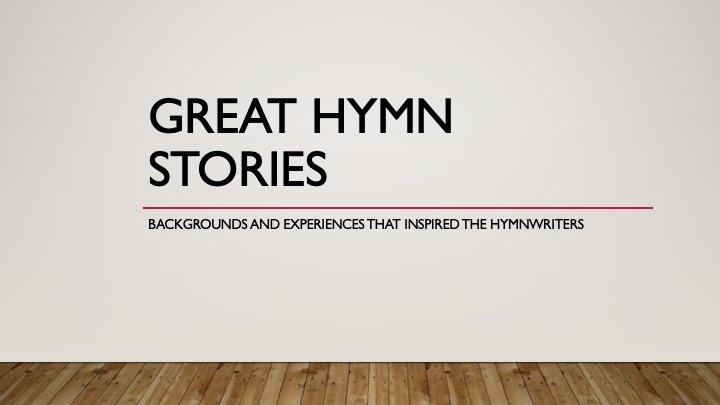
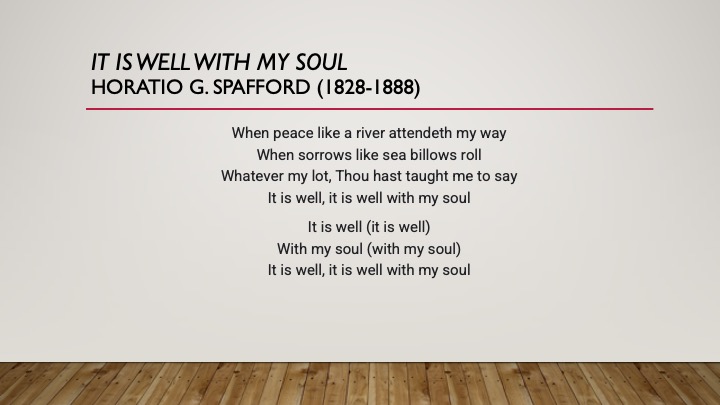
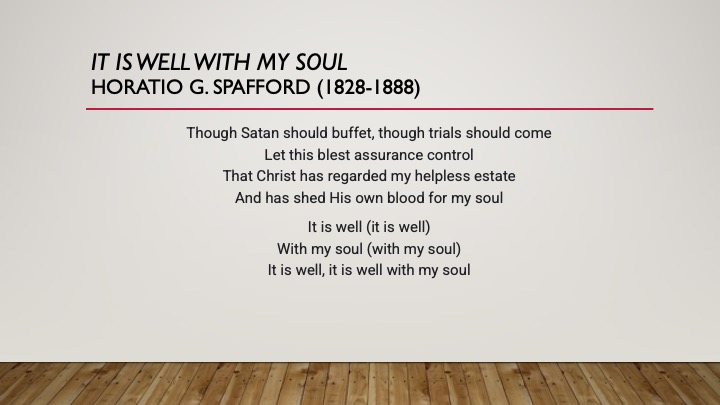
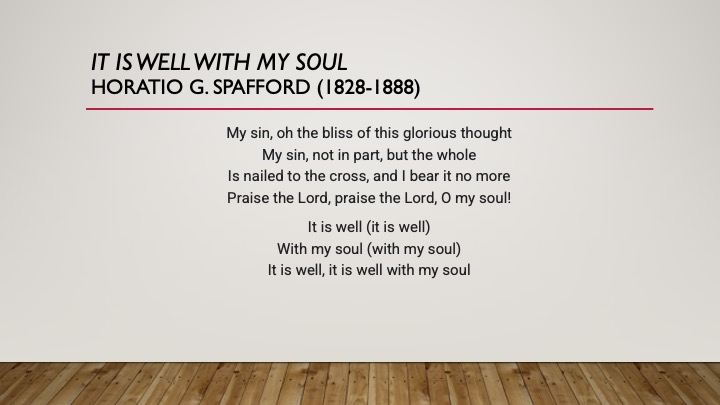
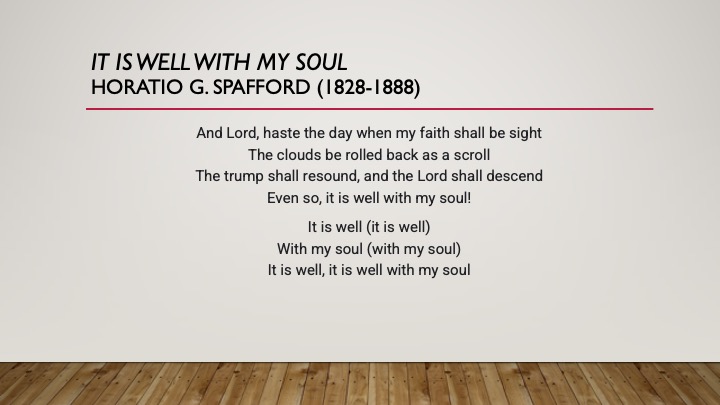
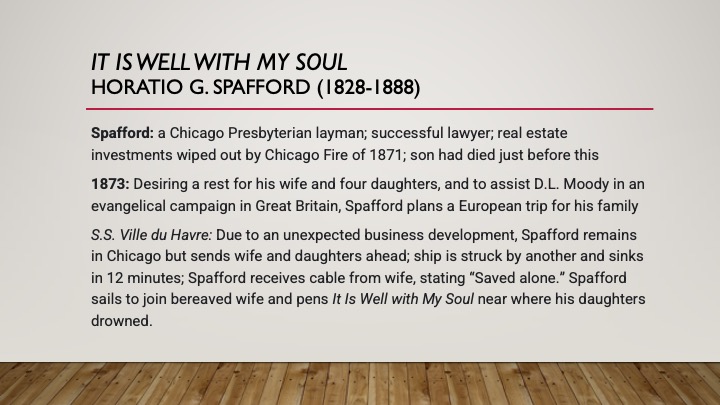
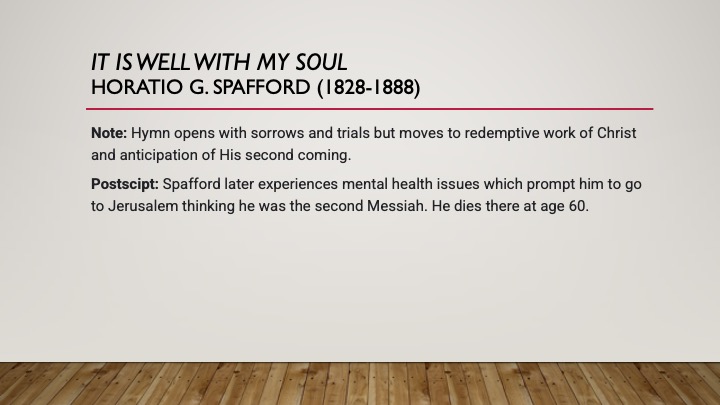
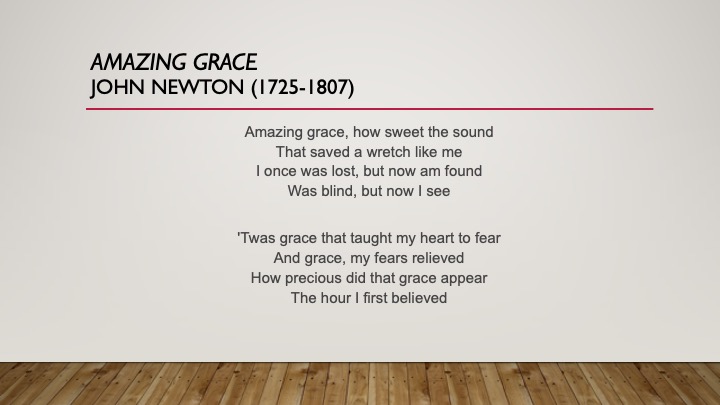
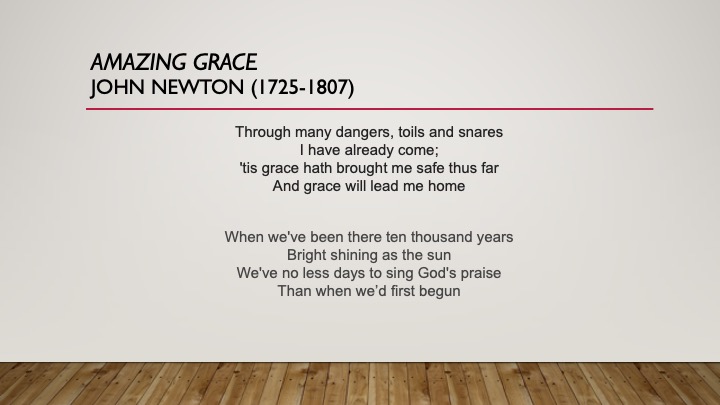
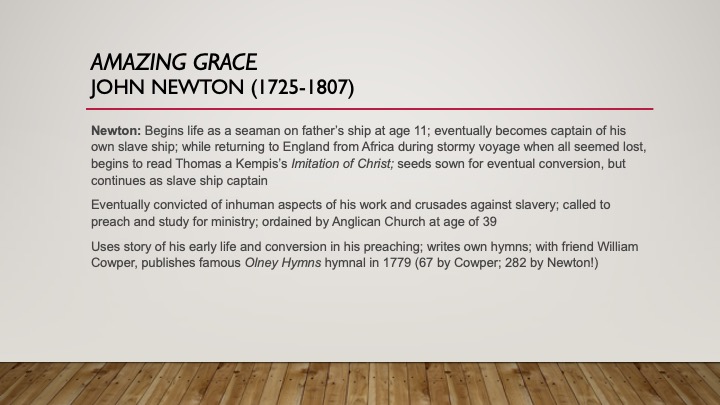
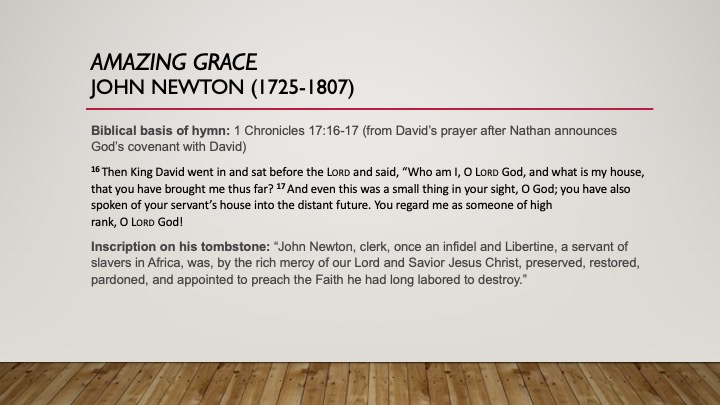
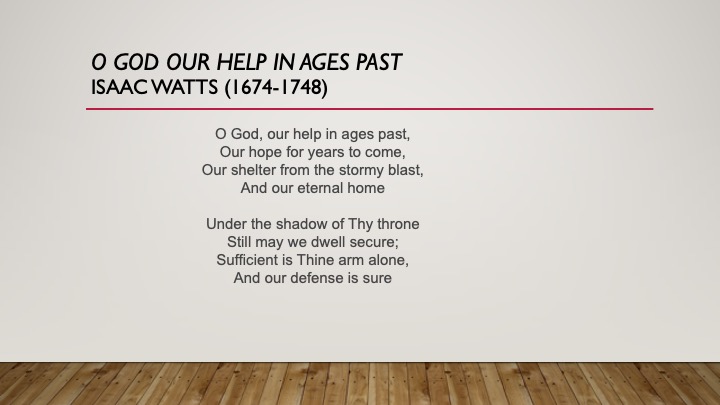
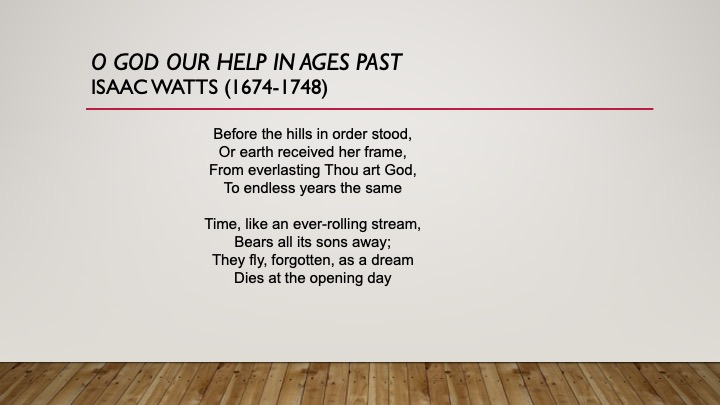
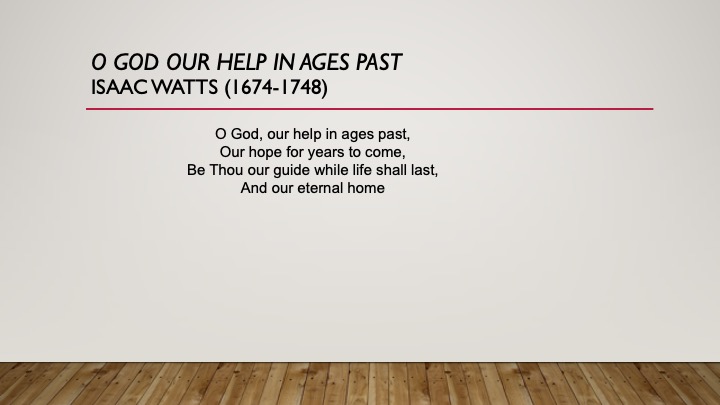
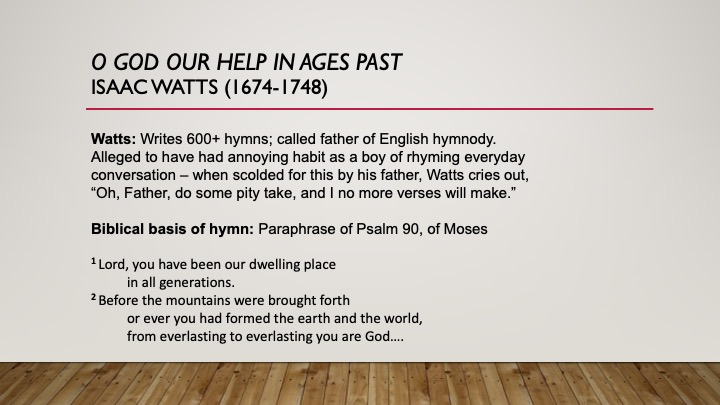
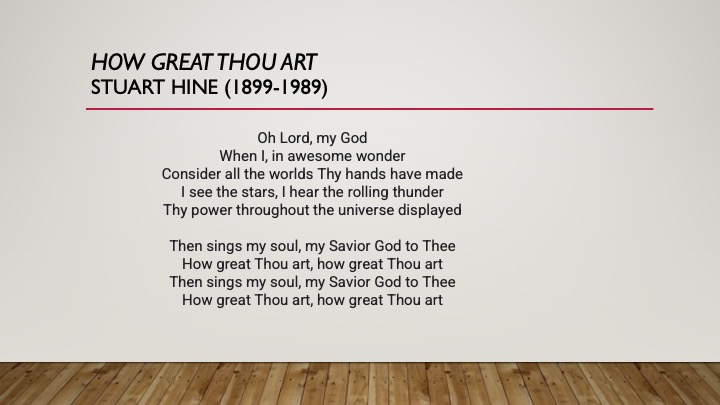
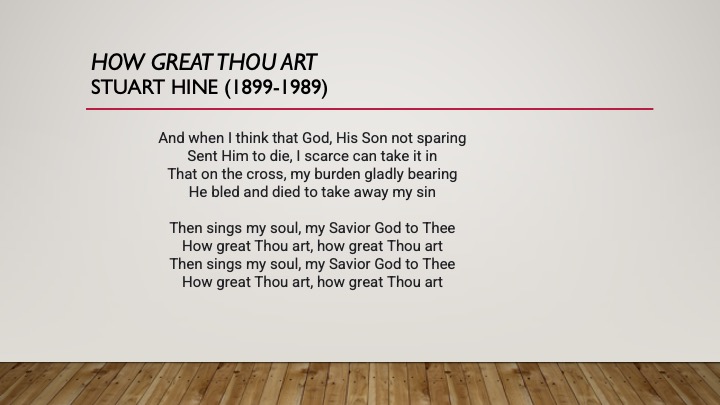
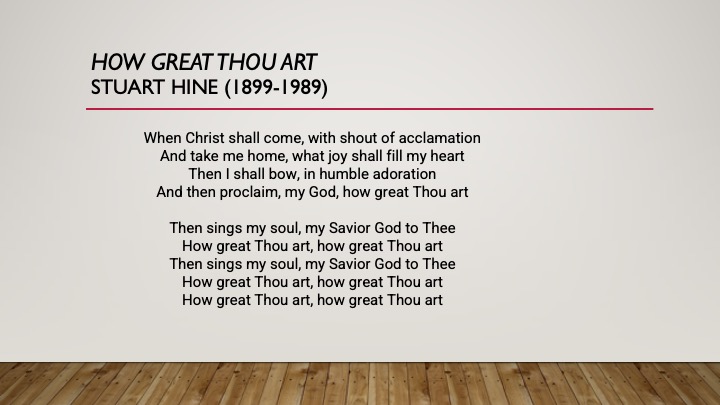
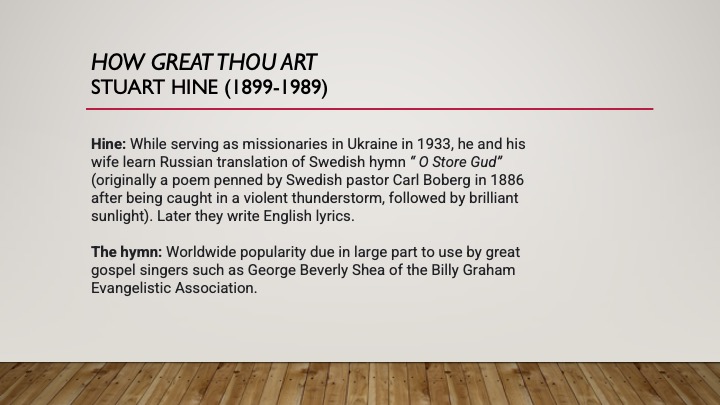
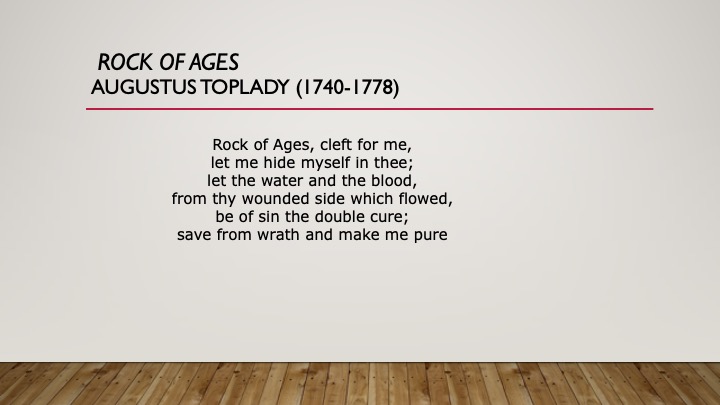
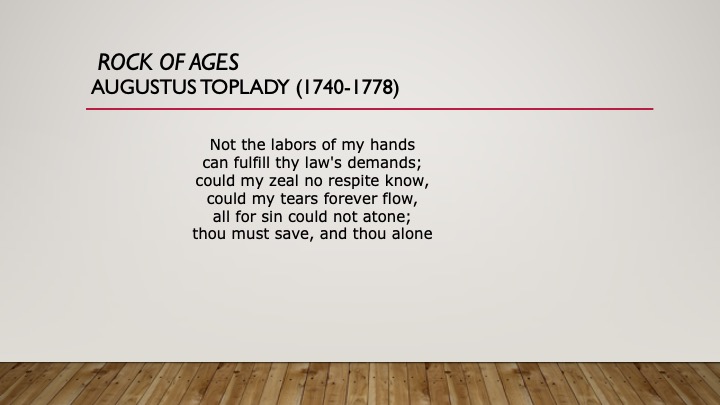
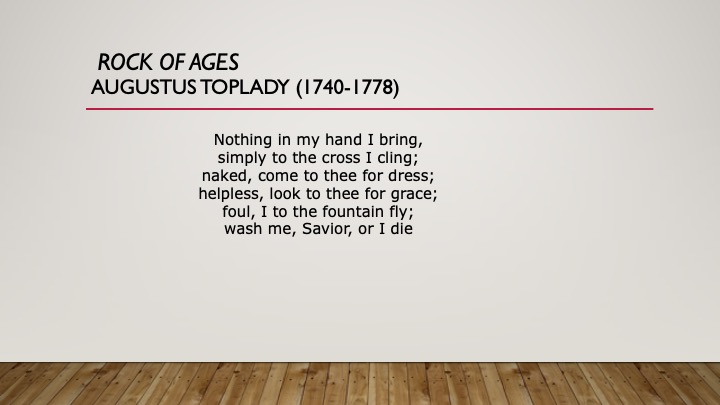
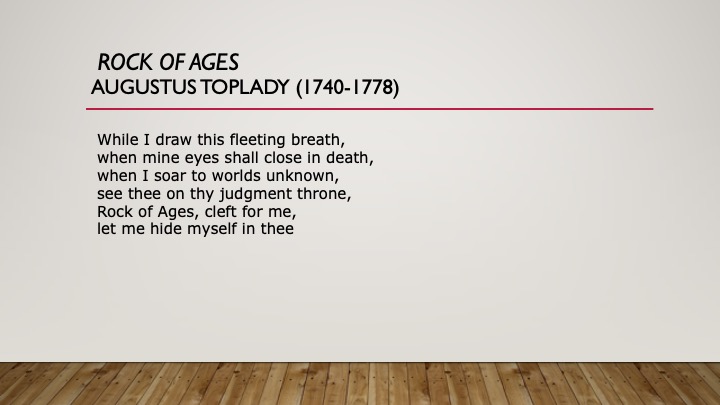
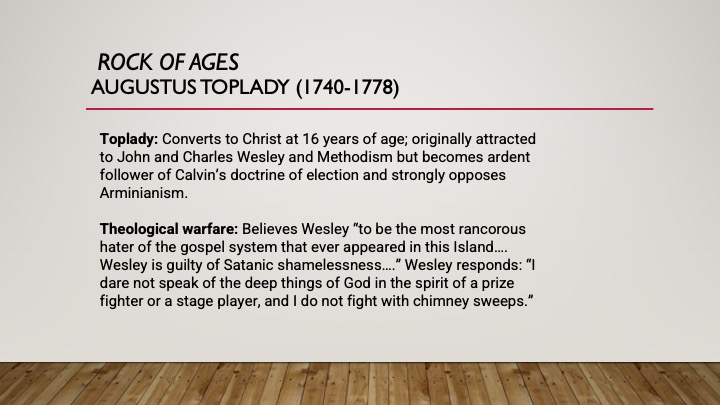













Great Hymn Stories
Backgrounds and Experiences that Inspired the Hymnwriters
It Is
Well With My soul
Horatio
G. Spafford (1828-1888)
When peace like a river attendeth
my way
When sorrows like sea billows roll
Whatever my lot, Thou hast taught me to say
It is well, it is well with my soul
It is well (it is well)
With my soul (with my soul)
It is well, it is well with my soul
Though Satan should buffet,
though trials should come
Let this blest assurance control
That Christ has regarded my helpless estate
And has shed His own blood for my soul
It is well (it is well)
With my soul (with my soul)
It is well, it is well with my soul
My sin, oh the bliss of this
glorious thought
My sin, not in part, but the whole
Is nailed to the cross, and I bear it no more
Praise the Lord, praise the Lord, O my soul!
It is well (it is well)
With my soul (with my soul)
It is well, it is well with my soul
And Lord, haste the day when my
faith shall be sight
The clouds be rolled back as a scroll
The trump shall resound, and the Lord shall descend
Even so, it is well with my soul!
It is well (it is well)
With my soul (with my soul)
It is well, it is well with my soul
Spafford: a Chicago Presbyterian layman; successful lawyer; real estate investments wiped out by Chicago Fire of 1871; son had died just before this
1873: Desiring a rest for his wife and four daughters, and to assist D.L. Moody in an evangelical campaign in Great Britain, Spafford plans a European trip for his family
S.S. Ville du Havre: Due to an unexpected business development, Spafford remains in Chicago but sends wife and daughters ahead; ship is struck by another and sinks in 12 minutes; Spafford receives cable from wife, stating “Saved alone.” Spafford sails to join bereaved wife and pens It Is Well with My Soul near where his daughters drowned.
Amazing Grace
John Newton (1725-1807)
Amazing grace, how sweet the
sound
That saved a wretch like me
I once was lost, but now am found
Was blind, but now I see
'Twas
grace that taught my heart to fear
And grace, my fears relieved
How precious did that grace appear
The hour I first believed
Through many dangers, toils and snares
I have already come;
'tis grace hath brought me safe
thus far
And grace will lead me home
When we've been there ten thousand years
Bright shining as the sun
We've no less days to sing God's praise
Than when we’d first begun
Newton: Begins life as a seaman on father’s ship at age 11; eventually becomes captain of his own slave ship; while returning to England from Africa during stormy voyage when all seemed lost, begins to read Thomas a Kempis’s Imitation of Christ; seeds sown for eventual conversion, but continues as slave ship captain
Eventually convicted of inhuman aspects of his work and crusades against slavery; called to preach and study for ministry; ordained by Anglican Church at age of 39
Uses story of his early life and conversion in his preaching; writes own hymns; with friend William Cowper, publishes famous Olney Hymns hymnal in 1779 (67 by Cowper; 282 by Newton!)
Biblical basis of hymn: 1 Chronicles 17:16-17 (from David’s prayer after Nathan announces God’s covenant with David)
16 Then King David went in and sat before the Lord and said, “Who am I, O Lord God, and what is my house, that you have brought me thus far? 17 And even this was a small thing in your sight, O God; you have also spoken of your servant’s house into the distant future. You regard me as someone of high rank, O Lord God!
Inscription on his tombstone: “John Newton, clerk, once an infidel and Libertine, a servant of slavers in Africa, was, by the rich mercy of our Lord and Savior Jesus Christ, preserved, restored, pardoned, and appointed to preach the Faith he had long labored to destroy.”
O God
Our Help in Ages Past
Isaac Watts (1674-1748)
O
God, our help in ages past,
Our hope for years to come,
Our shelter from the stormy blast,
And our eternal home
Under
the shadow of Thy throne
Still may we dwell secure;
Sufficient is Thine arm alone,
And our defense is sure
Before the hills in order stood,
Or earth received her frame,
From everlasting Thou art God,
To endless years the same
Time, like an ever-rolling stream,
Bears all its sons away;
They fly, forgotten, as a dream
Dies at the opening day
O God, our help in ages past,
Our hope for years to come,
Be Thou our guide while life shall
last,
And our eternal home
Watts: Writes 600+ hymns; called father of English hymnody. Alleged to have had annoying habit as a boy of rhyming everyday conversation – when scolded for this by his father, Watts cries out, “Oh, Father, do some pity take, and I no more verses will make.”
Biblical basis of hymn: Paraphrase of Psalm 90, of Moses
1 Lord,
you have been our dwelling place
in
all generations.
2 Before
the mountains were brought forth
or
ever you had formed the earth and the world,
from
everlasting to everlasting
you are God….
How
Great Thou Art
Stuart
Hine (1899-1989)
Oh Lord, my God
When I, in awesome wonder
Consider all the worlds Thy hands have made
I see the stars, I hear the rolling thunder
Thy power throughout the universe displayed
Then sings my soul, my Savior God
to Thee
How great Thou art, how great Thou art
Then sings my soul, my Savior God to Thee
How great Thou art, how great Thou art
And when I think that God, His
Son not sparing
Sent Him to die, I scarce can take it in
That on the cross, my burden gladly bearing
He bled and died to take away my sin
Then sings my soul, my Savior God
to Thee
How great Thou art, how great Thou art
Then sings my soul, my Savior God to Thee
How great Thou art, how great Thou art
When
Christ shall come, with shout of acclamation
And take me home, what joy shall fill my heart
Then I shall bow, in humble adoration
And then proclaim, my God, how great Thou art
Then
sings my soul, my Savior God to Thee
How great Thou art, how great Thou art
Then sings my soul, my Savior God to Thee
How great Thou art, how great Thou art
How great Thou art, how great Thou art
How
Great Thou Art
Stuart
Hine (1899-1989)
Hine: While serving as missionaries in Ukraine in 1933, he and his wife learn Russian translation of Swedish hymn “ O Store Gud” (originally a poem penned by Swedish pastor Carl Boberg in 1886 after being caught in a violent thunderstorm, followed by brilliant sunlight). Later they write English lyrics.
The hymn: Worldwide popularity due in large part to use by great gospel singers such as George Beverly Shea of the Billy Graham Evangelistic Association.
Rock of Ages
Augustus
Toplady
(1740-1778)
Rock
of Ages, cleft for me,
let
me hide myself in thee;
let
the water and the blood,
from
thy wounded side which flowed,
be of
sin the double cure;
save
from wrath and make me pure
Not
the labors of my hands
can
fulfill thy law's demands;
could
my zeal no respite know,
could
my tears forever flow,
all
for sin could not atone;
thou
must save, and thou alone
Nothing
in my hand I bring,
simply
to the cross I cling;
naked,
come to thee for dress;
helpless,
look to thee for grace;
foul,
I to the fountain fly;
wash
me, Savior, or I die
While
I draw this fleeting breath,
when
mine eyes shall close in death,
when
I soar to worlds unknown,
see
thee on thy judgment throne,
Rock
of Ages, cleft for me,
let
me hide myself in thee
Toplady: Converts to Christ at 16 years of age; originally attracted to John and Charles Wesley and Methodism but becomes ardent follower of Calvin’s doctrine of election and strongly opposes Arminianism.
Theological warfare: Believes Wesley “to be the most rancorous hater of the gospel system that ever appeared in this Island…. Wesley is guilty of Satanic shamelessness….” Wesley responds: “I dare not speak of the deep things of God in the spirit of a prize fighter or a stage player, and I do not fight with chimney sweeps.”
Note: Toplady publishes hymn text as climax to article he writes arguing just as England could never pay her national debt, so man through his own efforts could never satisfy justice of a holy God. Some lines in hymn are clear rebuttals of Wesleyan teaching (e.g., “thou must save and thou alone”). Toplady actually plagiarizes text from an earlier Charles Wesley hymn!
Biblical basis of hymn: 1 Corinthians 10:1-4
I do not want you to be ignorant, brothers and sisters, that our ancestors were all under the cloud, and all passed through the sea, 2 and all were baptized into Moses in the cloud and in the sea, 3 and all ate the same spiritual food, 4 and all drank the same spiritual drink. For they drank from the spiritual rock that followed them, and the rock was Christ.
O for
a Thousand Tongues to Sing
Charles
Wesley (1707-1788)
O for
a Thousand Tongues to Sing
Charles
Wesley (1707-1788)
O
for a thousand tongues to sing
my great Redeemer's praise,
the glories of my God and King,
the triumphs of his grace!
My
gracious Master and my God,
assist me to proclaim,
to spread thro' all the earth abroad
the honors of your name
Jesus!
the name that charms our fears,
that
bids our sorrows cease,
'tis
music in the sinner's ears,
'tis
life and health and peace
He
breaks the power of cancelled sin,
he sets the prisoner free;
his blood can make the foulest clean;
his blood availed for me
To
God all glory, praise, and love
be now and ever given
by saints below and saints above,
the Church in earth and heaven
Wesley: Along with Watts, most influential writers of English hymnody. Writes 6500+ hymn texts
The hymn: Written in 1749 on occasion of 11th anniversary of his conversion experience. Inspired by remark of Moravian leader Peter Bohler: “Had I a thousand tongues, I would praise Jesus Christ with all of them.” Originally had 19 stanzas and was titled “For the Anniversary Day of One’s Conversion.” Most verses, no longer used, related to Wesley’s personal experience. E.g., “I felt my Lord’s atoning blood close to my soul applied. Me, me He loved – the Son of God – for me, for me He died.”
Blessed
Assurance
Fanny
Crosby (1820-1908)
Blessed assurance, Jesus is
mine!
Oh, what a foretaste of glory divine!
Heir of salvation, purchase of God
Born of his Spirit, washed in His blood
This is my story, this is my
song
Praising my Savior all the day
long
This is my story, this is my song
Praising my Savior all the day
long
Perfect submission, perfect
delight
Visions of rapture now burst on my sight
Angels descending bring from above
Echoes of mercy, whispers of love
This
is my story, this is my song
Praising my Savior all the day
long
This is my story, this is my song
Praising my Savior all the day
long
Perfect submission, all is at
rest
I in my Savior am happy and blest;
Watching and waiting, looking above,
Filled with His goodness, lost in His love
This is my story, this is my
song
Praising my Savior all the day
long
This is my story, this is my song
Praising my Savior all the day
long
Crosby: Congenitally blind; writes 8,000+ gospel texts, including 3/week while under contract to music publisher; uses over 200 pen names. Known as “Queen of Gospel Song Writers.”
The hymn: Music composed by Mrs. Joseph Knapp, an amateur musician, wife of founder of Metropolitan Life Insurance Company, and close friend of Crosby. Knapp played melody for Crosby and asked,
“ What does this tune say?” Crosby responded, “Why, that says ‘Blessed Assurance, Jesus is Mine.’”
Inscription on her tombstone: “She hath done what she could.” (Jesus speaking of Mary, sister of Martha and Lazarus, after she anointed him with costly perfume – Mark 14:3-9; Matt 26:6-13; John 12:1-8)
Just
as I am
Charlotte
Elliott (1789-1871)
Just as I am, without one
plea
But that Thy blood was shed for me
And that Thou bid'st
me come to Thee
Oh, Lamb of God, I come, I come
Just as I am, though tossed
about
With many a conflict, many a doubt
Fighting and fears within, without,
Oh, Lamb of God, I come, I come
Just as I am, Thou wilt receive
Wilt
welcome, pardon, cleanse, relieve
Because
Thy promise I believe
Oh,
Lamb of God, I come, I come
“Without question, this hymn has touched more hearts and influenced more people for Christ than any other song ever written. The text was born within the soul of an invalid woman who wrote these words out of intense feelings of uselessness and despair.” Kenneth Osbeck, 101 Hymn Stories
Elliott: Health fails rapidly at age 30; becomes bed-ridden for rest of her life. Visited by Swiss evangelist Dr. Caesar Malan in 1822; counsels a depressed Elliott and tells her, “You must come just as you are, a sinner, to the Lamb of God that taketh away the sin of the world.” Elliott celebrates the anniversary of this visit every year as her spiritual birthday.
The hymn: Writes text of hymn 14 years later. Published in second edition of her Invalid’s Hymn Book, containing 115 of her original works. Written to aid financially her brother’s building of school for children of poor clergy. Says her brother: “In the course of a long ministry, I hope to have been permitted to see some fruits of my labors; but I feel more has been done by a single hymn of my sister’s.”
Silent
night
Joseph
Mohr (1792-1848)
Silent night, holy night!
All is calm, all is bright.
Round yon Virgin, Mother and Child.
Holy infant so tender and mild,
Sleep in heavenly peace,
Sleep in heavenly peace
Silent night, holy night!
Shepherds quake at the sight.
Glories stream from heaven afar
Heavenly hosts sing Alleluia,
Christ the Savior is born!
Christ the Savior is born
Silent night, holy night!
Son of God love's pure light.
Radiant beams from Thy holy face
With dawn of redeeming grace,
Jesus Lord, at Thy birth
Jesus Lord, at Thy birth
Mohr: Born in Salzburg, Austria. Ordained as priest in Roman Catholic Church in 1815. Writes Silent Night in 1818 while serving as assistant priest at St. Nicholas Church in nearby Oberndorf.
(Memorial Chapel – the Silent Night Chapel – completed in 1937)
The hymn: Learns church organ won’t function, so Mohr writes own Christmas hymn for Christmas Eve Mass. Takes text to Franz Gruber, village schoolmaster and church organist, to compose tune. Says Gruber, “Friend Mohr, you have found it – the right song – God be praised!” Mohr and Gruber sing hymn that night, accompanied by Gruber’s guitar. Carol spreads when organ repairman Karl Maurachen obtains a copy.